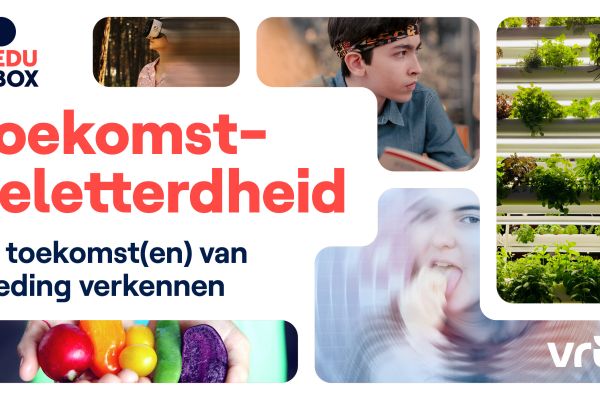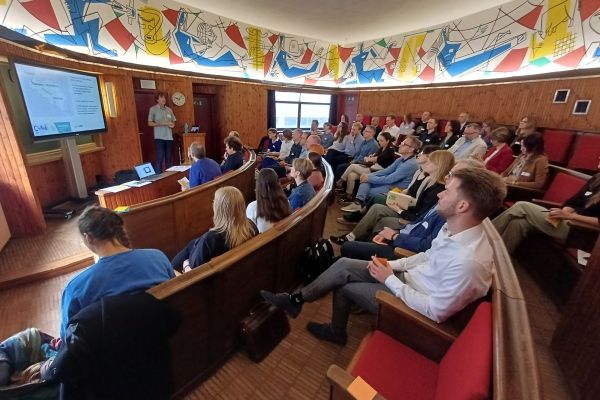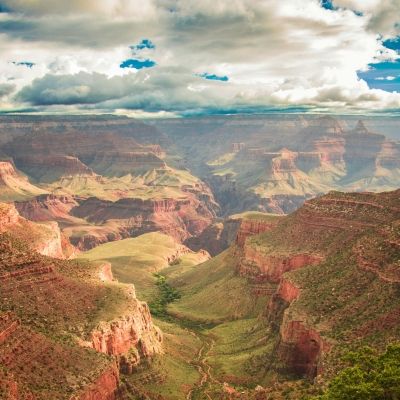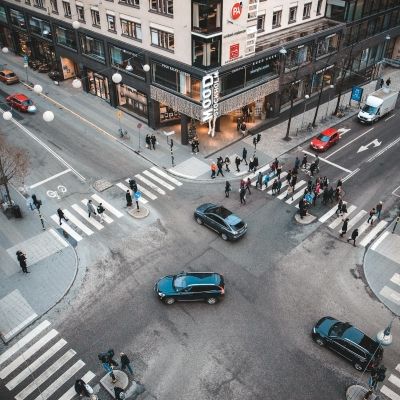How do you make a business park water resilient?
The Flanders WaterProof process demonstrates how we can better arm our region against drought and other consequences of climate change, such as extreme precipitation. This will take place in three local, but large-scale 'demo areas'. One of these is a business park in Tielt, West Flanders. This site is being made waterproof with eight specific actions that provide a benefit from water. The intention is to replicate these water benefits elsewhere in Flanders later on.

Flanders WaterProof is part of the ambitious Blue Deal, the broad policy programme through which the Flemish government is taking on the battle against drought. In doing so, WaterProof is focusing on measures to tackle both drought and flooding – both sides of the climate change coin. The three demo areas are intended to gain experience with smart interventions such as water buffering, rewetting and circular water use, as well as with local collaboration for handling water effectively and sustainably. At the business park in Tielt, the challenge is to reconcile water solutions with the further development of the site and a pleasant working environment.
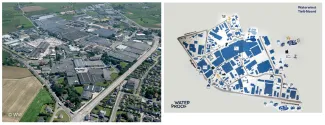
Circular water and buffering as solutions to drought
The WaterProof process runs to early 2025, so this is also the case for the demonstration at the business park in Tielt. 'We've based this on eight potential strategies or "water benefits" for making this site waterproof,' says Wim Schiettecatte of VITO. ‘For each of these eight, we're studying what the actual benefit for the whole business park will look like.’ The water benefits form a diverse range of water solutions, from depaving (transforming concrete and asphalt into greenery) through collective buffering to maximum reuse of rainwater.
Collectivity is indeed an element that is central to both the demo area and the entire WaterProof project. The aim is for maximum interaction with local stakeholders. At the business park in Tielt, these are fifteen leading companies (including a large carpet manufacturer as well as agricultural firms next to the industrial site) and the local fire brigade. Schiettecatte: ‘We can only achieve the water benefits if we include the local stakeholders and apply the water solutions in an integrated manner. VITO’s transition team Nexus and Vlakwa, the Flemish Water Knowledge Centre, provide valuable support here.’
In order to enhance the support base, meeting sessions are being organised in Tielt. At these events, local partners can sign up as participants in one or more water benefits right away. In June 2022, there was an event where the business park was represented and the Tielt city council was present in large numbers together with VITO. These events also raise questions that the experts (from VITO, De Watergroep and Aquafin) had not initially included in the scope – but that is precisely the aim of the synergy with local stakeholders in implementing the project. ‘We know from infiltration tests that the natural soil at the business park is rather average for water penetration,’ says Schiettecatte. ‘Some local parties are therefore worried that the increased infiltration we're proposing could lead to flooding. So this is certainly an aspect that will need some further attention.’
Other water benefits saw agreement being reached more rapidly. Two of these are already on track to implementation and are currently in the permit phase. These include the reconstruction of an access road on the industrial site with a safe cycle path, an innovative infiltrating sub-foundation, a smartly controlled rainwater sewer and a green strip between the road and cycle path – one example of how a water solution can also improve mobility and greening.
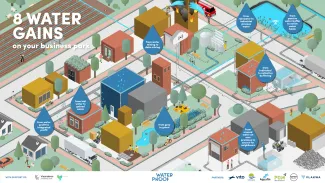
Rainwater harvesting in business parks
Another concern from the local companies involves PFAS, the family of chemical substances that all of Flanders was introduced to in the past two years. Schiettecatte: ‘Substances from the PFAS family are released through fire extinguishing, among other things. In order to give the companies peace of mind, we are looking at the extent to which the local, historical pollution from these substances constitutes a risk of contaminating the soil and the groundwater.
Another thing that came up during the local meetings was company law. After all, this is focused on individual companies, yet the essence of the Tielt demo area is precisely to strive for communal solutions. ‘It's crucial for neighbouring companies to collaborate,’ emphasises Schiettecatte. ‘One firm might have a large roof surface, giving it great potential for catching rainwater, while its neighbour might have a smaller roof. But that neighbour may have a far higher need for water in carrying out its processes. These kinds of aspects can be better aligned.’
The aim in the project is therefore to make the Tielt business park waterproof. But ultimately, other business parks – and similar sites – need to be able to benefit from that too. ‘We're actually developing a toolbox here that can be used to make business parks all across Flanders waterproof,’ says Schiettecatte. ‘It's not the intention that all the tools (or water benefits) will be used in exactly the same way elsewhere too. But it is important to have them at your disposal so they can be applied where the specific local situation demands it.’




